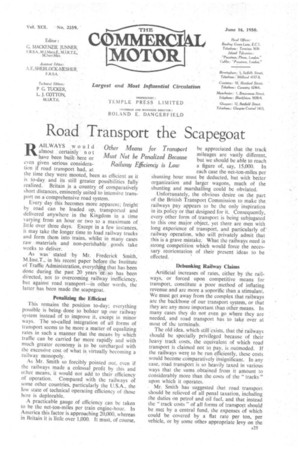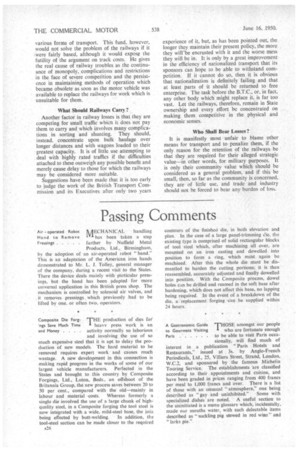Road Transport the Scapegoat
Page 27

Page 28

If you've noticed an error in this article please click here to report it so we can fix it.
RAILWAYS would almost certainly n o t have been built here or even given serious consideration if road transport had, at the time they were mooted, been as efficient as it is to-day and its still greater, possibilities fully realized. Britain is a country of comparatively short distances, eminently suited to intensive transport on a comprehensive road system.
Every day this becomes more apparent; freight by road can be loaded up, transported and delivered anywhere in the Kingdom in a time varying from an hour or two to a maximum of little over three days. Except in a few instances, it may take the longer time to load railway trucks and form them into trains, whilst in many cases raw materials andnon-perishable goods take weeks to deliver.
As was' stated by Mr. Frederick Smith, M.Inst.T., in his recent paper before the Institute of 'Traffic Administration, everything that has been done during the past 20 years or so has been directed, not to overcoming railway inefficiency, but against road transport—in other words, the latter has been made the scapegoat.
Other Means Must Not be P Railway Effic
Penalizing the Efficient This remains the position to-day; everything possible is beingdone to bolster up our railway system instead of to improve it, except in minor ways. The so-called integration of all forms of transport seems to be more a matter of equalizing rates in such a manner that the means by which traffic can be carried far more rapidly and with much greater economy is to be surcharged with the excessive cost of what is virtually becoming a railway monopoly.
As Mr. Smith so forcibly pointed out, even if the railways made a colossal profit by this and other means, it would not add to their efficiency of operation. Compared with the railways of some other countries, particularly the U.S.A.. the low state of technical operating efficiency of those here is deplorable.
A practicable gauge of efficiency can be taken to be the net-ton-miles per train engine-hour. In America this factor is approaching 20,000, whereas in Britain it is little over 1,000. It must, of course, be appreciated that the track mileages are vastly different. but we should be able to reach a figure of, say, 15,000. In each case the net-ton-miles per shunting hour must be deducted, but with better organization and larger wagons, much of the shunting and marshalling could be obviated.
Unfortunately, the obvious desire on the part of the British Transport Commission to make the railways pay appears to be the only inspiration in its policy or that designed for it. Consequently, every other form of transport is being subjugated to this one major object, yet there are men with long experience of transport, and particularly of' railway operation, who will privately admit that this is a grave mistake. What the railways need is strong competition which would force the necessary reorientation of their present ideas to be effected.
Debunking Railway Claims Artificial increases of rates, either by the railways, or forced upon competitive means for transport, constitute a poor method of inflating revenue and are more a soporific than a stimulant. We must get away from the complex that railways are the backbone of our transport system, or that they are any more important than other means. In many cases they do not even go where they are needed, and road transport has to take over at most of the terminals.
The old idea, which still exists, that the railways should be specially privileged because of their heavy track costs, the equivalent of which road transport is claimed not to pay, is outmoded. If the railways were to be runefficiently, these costs would become comparatively insignificant. In any case, road transport is so heavily taxed in various ways that the sums obtained from it amount to considerably more than the costs of the " tracks " upon which it operates.
Mr. Smith has suggested that road transport should be relieved of all penal taxation, including the duties on petrol and oil fuel, and that instead the track costs" of all forms of transport should be met by a central fund, the expenses of which could be covered by a flat rate per ton, per vehicle, or by some othet, appropriate levy on the various forms of transport. This fund, however, would not solve the problem of the railways if it ,were fairly based, although it would expos; the futility of the argument on track costs. He gives the real cause of railway troubles as the continuance of monopoly, complications and restrictions in the face of severe competition and the persistence in maintaining methods of operation which became obsolete as soon as the motor vehicle was available to replace the railways for work which is unsuitable for them.
What Should Railways Carry ?
Another factor in railway losses is that they are competing for small, traffic which it does not pay them to carry and which involves many complications in sorting and shunting. They should, instead, concentrate upon bulk haulage over longer distances and with wagons loaded to their greatest capacity. It is of little use attempting to deal with highly rated traffics if the difficulties attached to these outweigh any possible benefit and merely cause delay to those for which the railways may be considered more suitable.
Suggestions have been made that it is too early to judge the work of the British Transport Commission and its Executives after only two years experience of it, but, as has been pointed out, the longer they maintain their present policy, the more they will beencrusted with it and the worse mess they will be in. It is only by a great improvement in the efficiency of nationalized transport that its sponsors can hope to be able to withstand competition. If it cannot do so, then it is obvious that nationalization is definitely failing and that at least parts of it should be returned to free enterprise. The task before the B.T.C., or, in fact, any other body which might replace it, is far too vast. Let the railways, therefore, remain in State ownership and every effort be concentrated on making them competitive in the physical and economic senses.
Who Shall Bear Losses ?
It is manifestly most unfair to blame other means for transport and to penalize them, if the only reason for the retention of the railways be that they are required for their alleged strategic value—in other words, for military purposes. It is only their community value which should be considered as a general problem, and if this be small, then, so far as the community is concerned, they are of little use, and trade and industry should not be forced to bear any burden of loss.












































































